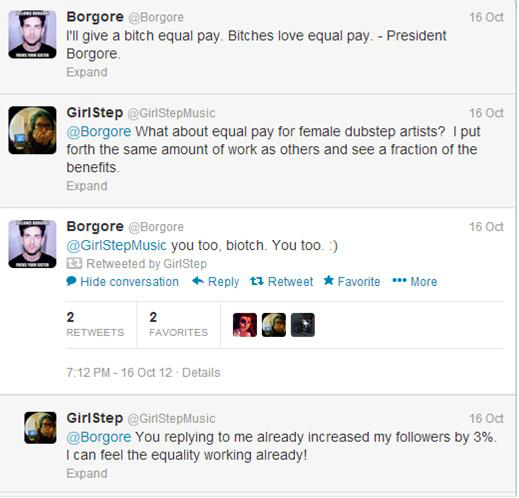I know most of you won’t read this…but I’m a 16-year-old house producer from Nigeria and…
The bane of many upcoming artists—regardless of level of talent—is the oftentimes difficult process of making their name known in their respective entertainment world. As many unknown artists can tell you, level of talent does not necessarily correlate to level of exposure. What is the key to having a successful, growing fanbase? Gaining exposure can be achieved through many methods, especially within the multifarious world of electronic internet communication. I will expose some common, bizarre and innovate ways of promoting your music, comment on the efficacy of these methods in gaining a fanbase, and hopefully give upcoming artists some useful suggestions to help them gain traction in building a successful, strong following.
I am going to start by commenting on the elephant in the room regarding online promotion “techniques:” Spam. I am convinced that not one metaphorical inch of SoundCloud is free of comments such as, ‘Nice song. If you like this one, check out MY music!” This commonality is annoying and may possibly damage the image of the artist, but has one advantage: It works if your music is interesting enough to hold the attention of anyone who happens to actually pay attention to frequent, self-promoting messages.
 Have a look one of the most notorious spammers whose iconic image constantly graces the Soundcloud comments bar:
Have a look one of the most notorious spammers whose iconic image constantly graces the Soundcloud comments bar:
While you most likely can see this icon on every EDM song on SoundCloud, his statistics don’t lie: 17,000 SoundCloud followers, 14,000 facebook likes, as well as an impressive 41,000 subscribers on his promotional channel, Electrostep Network, suggest he might be onto something..
While Electrode might have a reputation for self-promotion through annoying messages, his music alone exhibits enough quality to sustain a fanbase, regardless of his notorious advertising tactic. The only way spam can work is if it can be used to inform others of quality music—terrible music and spam is a recipe for disaster. Keep in mind that electrode’s music itself, not his spam, is the key to his popularity.
Random, annoying messages can increase your fanbase (provided your music is decent to begin with), but the problem with this type of promotion, aside from the fact it will paint your music project in a negative light, is that it is inefficient. Sure, sending out random invitations to view your song, accompanied by a polite and well-written commentary might get you some extra subscribers (along with an occasional “f*** you” and “screw off, spammer”), but given the amount of artists that attempt this method, most of those random messages will be ignored. Sending out terabytes worth of canned Emails and PMs begging others to check out your music solely as a way to promote yourself may only marginally increase your fanbase, will have a negative effect upon the public’s perception of your music, and sending out random messages to strangers is something “ain’t nobody got time for.”
Things can also take a turn for the bizarre when people look for inexpensive and admittedly admirably sly ways to promote their music. This track (http://www.youtube.com/watch?v=WypOTNBrnT0) is a perfect example of an unusual way to gain publicity. This song is clearly not produced by Skrillex, but many are lured into believing that they are listening to an unreleased Skrillex bootleg, only to find that they have been duped by an unknown (yet talented) artist seeking publicity. Oddities such as this arise from misguided ingenuity; I would not suggest techniques such as the one demonstrated above, but such tactics can be used to gain exposure. My caution about methods such as these: Use at your own risk.
A more conventional technique, and one that I believe is one of the most effective methods for legitimately increasing your fanbase is paid advertising. This method is accomplished through targeting music fans and their tastes through services such as YouTube or Facebook. This works especially well if you have a solid concept of where your music project fits within the spectrum of its respective genre, as you can appeal to fans of specific artists who share similar stylistic features to your music project. Online advertising can be an invaluable resource for music promotion, as can be seen for artists like The Ground Above Music, Protohype, and Carnage in gaining an online fanbase. The only downside to this type of promotion is that it requires a budget. A large budget isn’t guaranteed to “buy you fans,” but it can cause you to reach audiences on a larger scale and help popularize your name, making you more valuable to record labels and promotional sites. If you are serious about gaining popularity for your music project, I would suggest devoting a monthly online advertising budget dedicated toward reaching more music enthusiasts. An interesting, unique, or just plain odd advertising campaign can also attract more fans by sparking initial interest. Many of The Ground Above Music’s advertisements involve the artist staring directly into the viewer’s soul, a great attention-getter.
Another somewhat innovative technique artists can use to promote their work is by utilizing Twitter to increase their exposure. By directly tweeting at celebrities, using relevant hashtags, and creating amusing (and sometimes horrifying posts) artists can expand the reach of their fanbase. This can be especially beneficial if a popular artist responds to, or re-tweets a lesser-known artist’s post. This method can be a hit-and miss promotional method, but tweeting can be a very useful addition to any already-existing promotional campaign. This can be seen in upcoming artist GirlStep’s short conversational exchange with well-known dubstep artist, Borgore:

Remixing a popular song can be a great way to boost your popularity. Remixing (or sampling from) well-known songs will attract fans of the original artist to your page, giving you another way to reach fans who might enjoy your particular take on another artist’s work. This concept was most famously executed by EDM artist Madeon. His mashup, “Pop Culture” skyrocketed him to stardom.
The recent phenomenon, “Call Me a Hole,” a mashup of Nine-Inch-Nails and Carly Rae Jepsen demonstrates the ability of already-established artists’ works to act as a catalyst for increasing the popularity of upcoming DJs and producers.
If you attempt a viral YouTube or Soundcloud release, be sure to choose a song by an artist that is sufficiently popular—remixing obscurities like “B.R.” by Poor Rich Folk might please your current audience, but probably won’t reach many new fans.
It is a struggle for upcoming artists to gain initial traction, but through actively seeking ways of gaining exposure, newcomers can reach a broader audience. By far the most effective technique, in my opinion, is paid advertising. If you are seeking a career in the music industry, your music project is a financial investment you should take seriously. Advertising, however, is no substitute for activity in your respective music realm. Networking, remixing, playing at live venues and practicing your craft are all legitimate and effective ways to help get your name known. It also helps to have a little ingenuity (and oftentimes, bravery) when promoting your music. They key, above all, is having quality music that fans demand. After the initial start-up phase, quality music will always find its way to the top.




